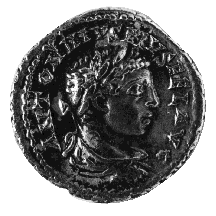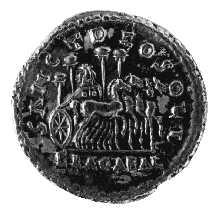



(116) Elagabalus - AR denarius, A.D. 218-222, 2.70 g. (inv. 91.210).
Obverse: Laureate, draped, and cuirassed bust of Elagabalus r.; ANTONINVS
PIVS FEL(IX) AVG(VSTVS): Antoninus Pius, fortunate Augustus.
Reverse: Slow quadriga r., bearing conical stone of Emesa with eagle, surrounded
by four parasols; SANCT(O) DEO SOLI, in exergue ELAGABAL(VS): to the sacred
sun god, Elagabalus.
Provenance: Coin Galleries, 1960.
Bibliography: H. Mattingly, E.A. Sydenham, and C.H.V. Sutherland, The
Roman Imperial Coinage IV.2: Macrinus to Pupienus (London 1936) 195.
Varius Avitus Bassianus was a great-nephew of Septimius Severus and the
hereditary high priest of the sun god Elagabalus at Emesa in Syria. When
Macrinus proved ineffectual, his troops were convinced to switch their allegience
to the fifteen-year-old priest by his mother and grandmother, who claimed
that he was the illegitimate son of Caracalla (see no. 114). They gave him
the official name Marcus Aurelius Antoninus, the same name Caracalla took
when his father claimed to be an Antonine, to legitimize his right to the
throne. They escorted the new emperor to Rome, where his promotion of the
strange rites of the cult of Elagabalus caused him to be known by the name
of the god. He soon became notorious for extravagance and corruption and
under the guise of his oriental cult engaged in such outrageous and licentious
behavior that the public became disgusted. When he plotted against his cousin,
Alexander Severus, whom his mother and the Senate had encouraged him to
adopt and make Caesar, the army revolted and murdered Elagabalus and his
mother.
The god Elagabalus was worshipped at Emesa in the form of a conical black
stone, which was brought to Rome with the new emperor and enshrined in a
temple of the sun god Sol on the Palatine. Once a year the stone was carried
through the streets of Rome in a quadriga with parasols, preceded by Elagabalus
walking backward in reverence of it. The quadriga carrying the stone is
depicted on the reverse of a number of his coins.
R.E.B.



All contents copyright (c) 1996.
Lawrence University
All rights reserved.